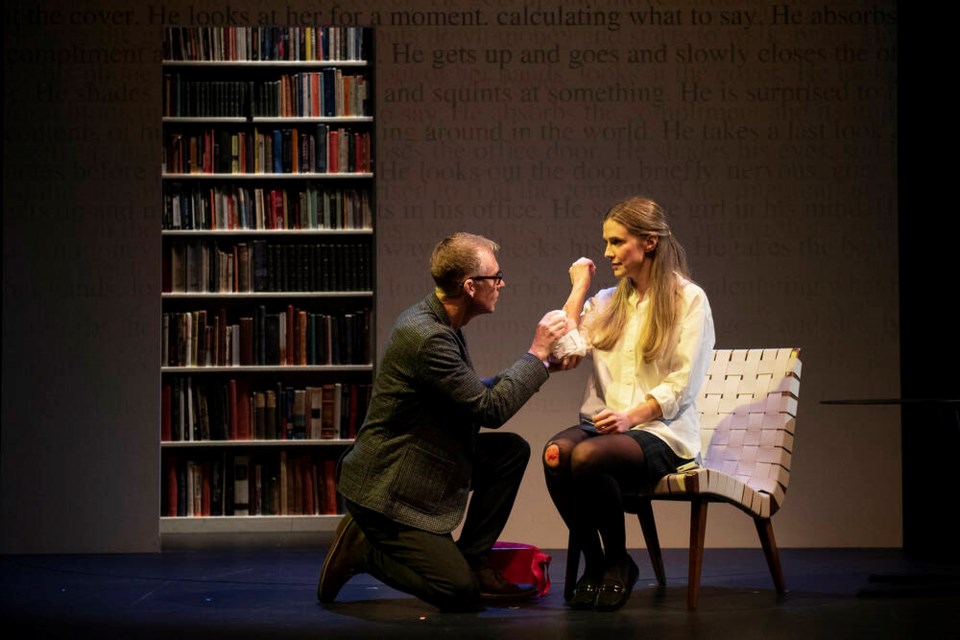Canadian playwright Hannah Moscovitch has long been fascinated with a taboo trope: the illicit affair between student and professor.
The Belfry Theatre has just opened a production of Moscovitch’s Sexual Misconduct of the Middle Classes, a Governor General’s Literary Award-winning play that premièred in 2020. This subtly subversive drama chronicles the torrid entanglement between a middle-aged prof and his bright yet naive 19-year-old student.
Moscovitch, one of the country’s best playwrights, has trodden this trail before. An early work, Essay, was a response to David Mamet’s Oleanna, the notorious feminist’s nightmare about a female student who gulls a professor into sex and sabotages his career. More recently there was Moscovitch’s Bunny (2016), about a female literature prof who — as a student — had sex with her own university instructors.
A well-acted and directed two-hander, Sexual Misconduct of the Middle Classes first introduces the character of Jon (Vincent Gale), a novelist teaching at a college. Jon has had considerable success as an author but we meet him at a crossroads. He’s separated from his third wife; he’s glugging whiskey in the middle of the afternoon. He’s lost interest in teaching; he’s at a stalemate with his writing. He’s angry and frustrated with both his personal life and professional life.
Enter Annie (Sara Canning), a lovely and talented first year student who’s awfully impressed with Jon. She sits in the front row of his lectures, gazing up in rapt attention, her lips parted. Annie likes to wear a red coat that attracts Jon like a bullfighter’s cape. When she ends up on his front porch one day, locked out of her apartment and winsomely helpless, the half-sloshed novelist beds her with rapacious gusto.
What follows is, in some ways, predictable. Eventually Jon’s personal circumstances change and Annie is discarded like an old pair of shoes. She meets Jon four year hence, older but wiser, having gained perspective on the affair. Finally, there’s a denouement in which Annie — by now a highly successful dramatist — takes back her power.
In some ways Sexual Misconduct of the Middle Classes seems a conventional enough tale with its echoes of Oleanna, Lolita, Francine Prose’s novel Blue Angel and many others. Yet in its own way the play is inventive and swims against the cultural tide.
In the post-#MeToo age there is no bigger villain than the powerful old guy preying sexually on young women. The poster boys are Harvey Weinstein and Jeffrey Epstein who are viewed, quite rightly, as absolute monsters.
In this social climate, with its violent distaste of such behavior, what makes Sexual Misconduct of the Middle Classes quietly subversive is Moscovitch’s empathetic portrayal of Jon. In our politically divided time, when counter-arguments are often not only dismissed but shouted down, it seems almost a brave act of defiance.
That’s not to say Moscovitch pulls her punches. Jon is selfish, even piggish, often crude and lewd. He speaks of others with misanthropic distain. He sometimes talks so disparaging about young people — they eat cheap food, smell bad and are “ugly” — it seems borderline bonkers. Yet the playwright is still interested in what makes him tick as a human being. We may not like Jon, but we end up understanding him a little.
Annie is much more enigmatic. Smart and beautiful, she’s a self-described social misfit struggling to find her place. Later, upon meeting Jon again, she says she wanted only to be liked and accepted. He was after sex; she sought mentorship and an entry into his literary world. The character is a bit of a blank slate and is even described as such by Jon. This is intentional — the notion, perhaps, is that Jon doesn’t truly know Annie, he merely invents a persona that suits him.
The seriousness of the subject matter is leavened by Moscovitch’s sharp wit. For instance, when the couple end up coupling in a car, their exertions result in the horn being tooted twice and the windshield wipers being activated. Her gift for language imbues the play with energy — the script is gritty, refreshingly vulgar. The dialogue — intelligent, sharply observed — is vivid, sometimes heightened almost to the point of cartoonishness.
Sexual Misconduct of the Middle Classes is good theatre well worth seeing. Yet not everything works perfectly. Jon, often addressing the audience directly, speaks of himself in the third person — something that’s initially confusing. The play creates in the audience some expectation of a powerful “payoff” — some kind of twist or revenge — that doesn’t quite materialize. And the ending seems a touch tepid and arbitrary.
Vincent Gale makes Jon intense and waspish — he’s a pathetic, lost man stabbing at illusions. In terms of acting, Annie — a more passive, less fleshed out character — is the more challenging role. Sara Canning navigates this rather well, shining especially in complex scenes during which little is said yet much is implied.
Michael Shamata’s direction — revealing a sensitive understanding of the text — is deft and delicate, never clouding the playwright’s intentions. A revolving stage is used particularly well. The main feature of Shawn Kerwin’s set is wonderful. It’s a cleverly lit rectangular backdrop decorated with what appear to be typed stage directions in the third person. At one point a door opens in the backdrop to reveal a monolithic wall of books, symbolic of Jon’s powerful position in society.

